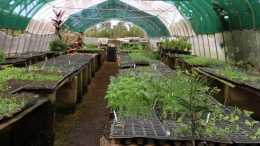
Pacific Islands – It may seem obvious that seeds are where most crops come from, yet much agricultural work in the Pacific had focused on the end product, and ignored these small, but essential components. Timor Leste is still the only country in the region to have a national seeds programme, and while work on seeds had been done in the Solomon Islands and Fiji, it was a long way from being embedded into comprehensive government programmes.
The past five years have seen a rapid rise in the recognition of the importance of seeds, and farmer organisations have been at the forefront of these changes. By utilising the Pacific Island Farmers Organisation Network to share knowledge between the farmer organisations already working on seeds, and to engage additional farmer organisations across more countries into seeds projects, farmers have become increasingly aware of the impact different seeds can have on their profitability.
Farmer organisations have started importing new varieties of tropically adapted seeds for their members, rather than using temperate climate seeds. They are improving the storing and packaging of seeds to extend shelf life and seed viability, and they are learning better techniques for collecting their own open-pollinated seed varieties, reducing dependence upon commercial hybrid varieties.
In Vanuatu, the Farm Support Association has seen farmers’ yields and incomes increase when they started importing and selling tropically adapted seeds. Previously, they had only temperate climate seeds available in the country, but now that Farm Support Association is importing these new seeds in bulk and repacking them for sale to farmers, there are noticeable improvements. There is more and better quality produce available in the markets for consumers, as a result of better germination rates and disease resistance. The seeds are in such hot demand from farmers, that the Farm Support Association is working with two retail outlets on the outer islands to improve the availability. Recognition of the impact of the new seeds has not gone unnoticed, with the Vanuatu Government now looking at importing these tropically adapted seeds themselves, making them available to even more farmers in Vanuatu.
These changes are bearing fruit, and farmers are benefiting from better disease resistance, increased yields and greater profits. What’s more, by selecting and saving seeds from their best, farmers will continue to adapt their crops to changing climatic conditions.
Recognising the achievements of farmer organisations, and under sustained pressure at the national level to get serious about seeds, governments across the Pacific have made establishing seed systems a national priority. Regional organisations and donors, responding to this new priority, are now developing their own seed programmes, often building on the work that has already been done by the farmer organisations. #
About MTCP2
The Medium-Term Cooperation Program Phase 2 (MTCP2), a five-year capacity building program supported by the International Fund for Agricultural Development (IFAD), the Swiss Agency for Development and Cooperation (SDC), and the European Union (EU), has been implemented in 19 countries across three sub-regions—Southeast Asia, South Asia, and the Pacific—engaging 1,544 sub-national farmers organizations (FOs) with a total membership of around 22 million farmers. The funding support (total budget of $ 5 million for the whole duration of the project across 19 countries) serves as a catalytic fund that will allow FOs to enhance their capacity to be effective channels of economic services to farmers. The program has contributed to the formation of the strong national platform of FOs with improved capacity to engage in policy processes and mobilize resources from mainstream agricultural development programs like extension services, credit, and pre and post-harvest facilities. The program also helped in transforming farmers’ associations into commodity-based cooperatives to strengthen the role of small-scale farmers within an inclusive and sustainable value-chain. The program is being implemented by the consortium Asian Farmers’ Association for Sustainable Rural Development (AFA) and La Via Campesina (LVC).

Comments are closed